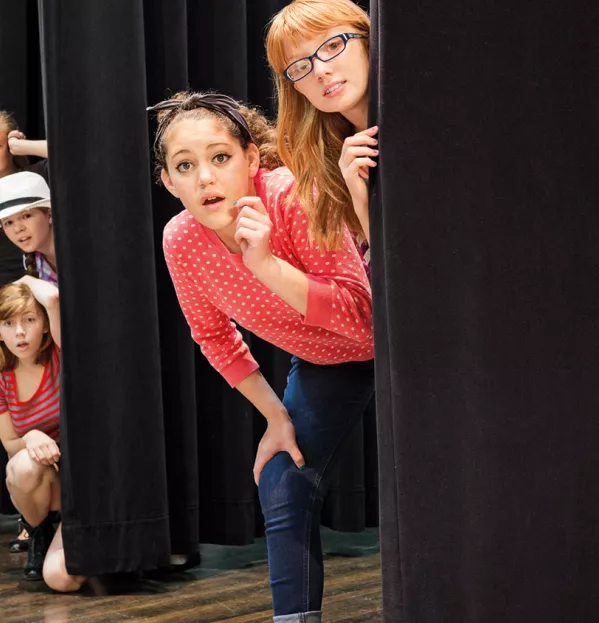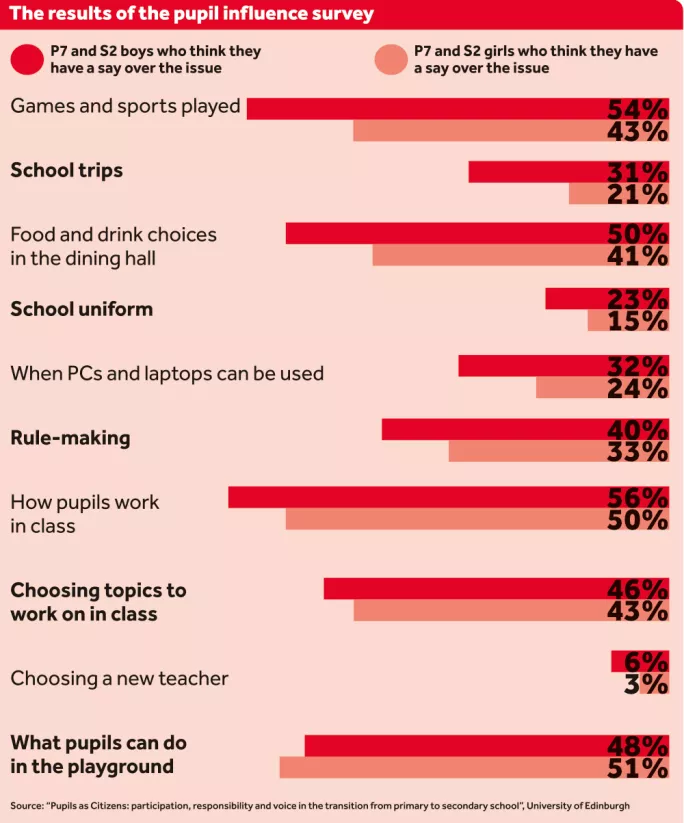Girls ‘have less of a say in school life’

Girls feel they have less of a say than boys in many aspects of school life, including what they learn, what they eat and what they wear, according to research.
A University of Edinburgh study suggests that boys are more confident that their views will be listened to, while girls are less assured and may become cynical about their lack of influence relatively early in their schooldays.
The researchers claim that their work breaks new ground by exploring pupils’ influence over school life during the transition from primary to secondary school, whereas previous studies have looked at the transition in relation to areas such as attainment.
More boys than girls felt they had more of a say in every area of school life analysed, both in and out of the classroom, including rule-making, school uniform and the food offered in the dining hall.
One of the most “striking” differences, according to the researchers, is in P7, where 70 per cent of boys feel that they have influenced which sports are played, against just 54 per cent of girls.
Girls only feel they have more say in one area: what pupils can do in the playground.
The study also uncovers signs of subtle sexism in that more P7 girls than boys tend to become “buddies” for younger pupils - which “may reflect expectations regarding the caring propensity of girls”.
Boys appear more confident
The researchers - Jane Brown, Linda Croxford and Sarah Minty - said their findings suggested that “boys may feel more confident that their views are listened to, or taken into account, while girls may be less self-assured or possibly more cynical regarding the extent of their influence”.
Girls may “self-exclude” from decision-making forums such as pupil councils, because they are “hesitant” about talking themselves up in front of peers.
The research states that schools “need to develop proactive solutions to encourage participation in girls”.

It notes, however, that a 2016 study in Northern Ireland found that girls were significantly more positive about their participation rights than boys, which was explained by “the sociability of girls and the fact that they are more socially responsible than boys”.
The latest findings were echoed by Kara Brown, director of YWCA Scotland - The Young Women’s Movement, which has researched similar issues.
“We have found resistance from teachers in response to young women’s requests for more open conversations to discuss issues that affect them,” she said, adding that the roles boys and girls take on at school “form the basis for gendered roles later in life”.
Ms Brown said that many girls would like mentoring or training in areas in which they lack confidence, such as assertiveness, financial literacy and negotiation skills.
Lena Carter, depute headteacher at Lochgilphead Joint Campus in Argyll and Bute, said that the report’s findings “do not surprise me greatly”.
She cited research by neuroscientist Sarah-Jayne Blakemore that showed the “critical impact” of peers, and suggested that girls were “even more acutely affected by peer influence than boys”.
Ms Carter, a drama teacher, suggested several ways in which quiet girls could be encouraged to participate more. For example, by using weekly SurveyMonkey online questionnaires in personal and social education (PSE) to allow the anonymous expression of views; encouraging discussion of brain development and peer pressure; and using drama to help pupils express themselves.
The researchers questioned 738 P7 and S2 children, ran 17 focus groups involving 130 children and carried out fieldwork in 25 schools across the country. To read the research report, visit bit.ly/Pupilinfluence.
You need a Tes subscription to read this article
Subscribe now to read this article and get other subscriber-only content:
- Unlimited access to all Tes magazine content
- Exclusive subscriber-only stories
- Award-winning email newsletters
Already a subscriber? Log in
You need a subscription to read this article
Subscribe now to read this article and get other subscriber-only content, including:
- Unlimited access to all Tes magazine content
- Exclusive subscriber-only stories
- Award-winning email newsletters